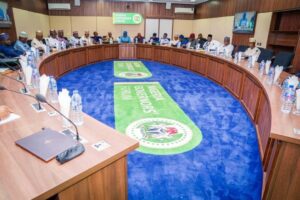
World Cancer Day: Africa records 573, 653 death rate in 2022 – WHO Regional Director
By Matthew Denis
In a bid to commemorate this year’s World Cancer Day, the World Health Organization (WHO) on Sunday has highlighted over what it term as a ‘disheartening’ situation of cancer in the African region, disclosing that approximately 882 882 new cancer cases occurred in the WHO African Region with around 573 653 deaths in 2022.
Revealing this in a message to mark the 2024 World Cancer Day with the theme: “Together, we challenge those in power”, WHO Regional Director for Africa, Dr Matshidiso Moeti explained that about 50 per cent of new cancer cases in adults in the region are due to breast, cervical, prostate, colorectal, and liver cancers.
Moeti who challenged political officeholders in Africa to go the extra mile to ensure a cancer-free Africa, warned that if urgent measures are not taken, cancer mortality in the region is projected to reach about one million deaths per year by 2030.
“Also, in 20 years, cancer death rates in Africa will overtake the global average of 30 per cent. This is more so because cancer survival rates in the WHO African region currently average 12 per cent much lower than the average of over 80 per cent in High-Income Countries.
“Nevertheless, we commend the progress made in cancer prevention and care in our region. For instance, 17 countries have introduced high-performance-based screening tests in line with the WHO recommendations.
“Also, 28 of our Member States have introduced nationwide HPV vaccination to reach about 60 per cent of the priority population targeted with HPV vaccination,” she explained.
She said this year’s theme was auspicious as it reinforces all persons and groups’ universal right to health.
Moeti said regardless of socioeconomic status, geographic location, age, and gender, every person must be afforded an equal chance at the prevention, diagnosis, and treatment of cancer.
She called on the region’s countries, communities, partners, and civil society to unite and foster universal access to cancer prevention and care.
She said: “Stakeholders must identify feasible priorities, implement evidence-based population-wide interventions and invest in cancer control.
“Countries should use the updated WHO Best Buys, the facilitative tool designed to enable governments to select lifesaving policies and interventions for non-communicable diseases.
“Leaders are responsible for ensuring that cancer prevention and care deploy technologies and therapies that are available at low cost to affected persons and their families, which are value for money.
Furthermore, countries should strengthen information systems to gather quality data for decision-making.
“We reiterate that civil society, especially organisations of cancer survivors or persons with lived cancer experiences, are critical in the fight against cancer in Africa. Such a whole-of-society approach to cancer prevention and care is the essence of this year’s World Cancer Day theme.
“Together, we challenge those in power” to go the extra mile for a cancer-free Africa.”
Noting that World Cancer Day is marked every 4th of February, She explained that between 2022 and 2024, the focus of World Cancer Day was to help close the cancer gap.
She said this year marked the third and final year of the campaign.
Moeti said the theme encompasses the global demand for leaders to prioritise and invest in cancer prevention and care and to do more to achieve a just and cancer-free world.



